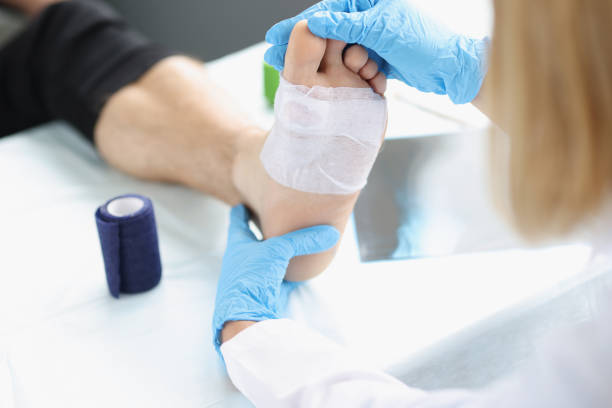Diabetic wound care requires consistent monitoring, as even small injuries can lead to serious complications if overlooked. These wounds, known as diabetic foot ulcers or leg ulcers, heal slowly and carry higher risks of infection than wounds in people without diabetes. Here are the benefits of regular checkups for diabetic wound management:
Early Detection of Potential Problems
Regular appointments allow healthcare providers to identify diabetic foot ulcers before they become severe. During these diabetic wound care visits, medical professionals carefully examine the feet and legs, looking for signs of breakdown, infection, or poor circulation. They check for changes in skin color, temperature, and texture that patients might miss.
Many people with diabetes experience nerve damage that reduces feeling in their feet. This condition, known as peripheral neuropathy, makes it difficult to notice small injuries or pressure ulcers. Healthcare providers use specialized tools to test sensation and blood flow during check-ups. Early detection helps prevent minor issues from developing into more complex wounds that require intensive treatment. Professional evaluation also includes assessment of footwear and daily habits that may contribute to wound development.
Professional Wound Management
Healthcare specialists bring expertise that patients cannot replicate on their own at home. They understand the complex nature of diabetic foot ulcers and have access to advanced treatment options. Professional wound cleaning, known as debridement, removes dead tissue that hinders healing and increases the risk of infection.
Specialized dressings and therapies speed recovery when applied correctly. Healthcare providers are familiar with the treatments that work best for various types of wounds and can adjust their approaches accordingly based on the healing progress. Infection prevention is another key benefit of professional care. Providers recognize early signs of bacterial growth and prescribe appropriate medications before infections become severe.
Monitoring Healing Progress
Regular diabetic wound care check-ups track more than just wound appearance. Healthcare providers monitor blood sugar levels, circulation, and overall health status during these visits. Good blood sugar control has a direct impact on wound healing speed and success rates. Providers help patients adjust medications, diet, and exercise plans to optimize healing conditions.
Circulation assessment helps identify blood flow problems that slow recovery. Poor circulation prevents nutrients and oxygen from reaching wound sites. Healthcare providers detect these issues through physical examination and specialized tests, then recommend treatments to improve blood flow. Progress documentation during regular visits helps providers make informed treatment decisions. They photograph wounds, measure dimensions, and note changes in appearance or drainage.
Empowering Patients Through Education
Educational support during check-ups helps patients become active participants in their diabetic wound management. Healthcare providers teach proper foot inspection techniques, helping patients recognize warning signs between appointments. They demonstrate correct wound cleaning methods and explain how to apply dressings safely.
Nutrition guidance forms another key component of patient education. Proper nutrition supports wound healing by providing the protein, vitamins, and minerals that damaged tissue needs for repair. Providers help patients understand which foods promote healing and how to incorporate these choices into diabetes meal plans.
Schedule Your Diabetic Wound Care Appointment Today
Regular check-ups are a fundamental component of successful diabetic wound care. These appointments provide early detection of problems, professional treatment expertise, comprehensive health monitoring, and valuable patient education. By working closely with healthcare providers, people with diabetes significantly improve their wound healing outcomes and reduce the risk of serious complications. Contact a qualified wound care specialist to schedule your wound management appointment and establish a regular monitoring schedule that fits your needs and health status.









Leave a Reply